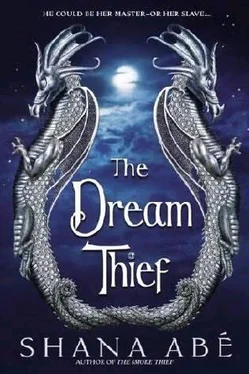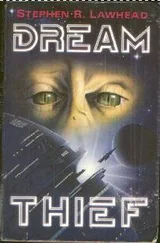Zane had his pistol primed when the knock came.
“Monsieur? Monsieur Lalonde?”
He placed his foot against the door, held the pistol down at his side, out of view, and turned the knob. A lanky man with watery blue eyes looked back at him.
“Oui?”
“My deepest regrets for disturbing you, sir,” said the hotel clerk in French. “You were left a missive at the front desk just now.”
The man held out his hand. A cream-colored envelope rested on his palm, Zane’s name-his real name-and room number inscribed in lavish script upon the vellum.
For a moment he only stared at it. The clerk waited, his narrow face betraying nothing. Zane closed the door, stuck the pistol into the waistband of his breeches at the small of his back, then opened the door again and took the envelope from the man’s hand.
“Merci.”
He found a coin in his pocket-God knew which country it was from-and flicked it to the clerk, who smiled and bowed and retreated down the sconce-lit corridor.
When the door was bolted again, he broke the wax seal.
Veuillez nous joindre pour notre célébration le samedi, 31 octobre, à neuf heures du soir.
Le dîner sera accompagne d’un orchestre.
Le Comte du Abony
Zane looked up from the invitation, frowning. Samedi was Saturday, today. Tonight.
Someone knew of him. Someone knew he was here; he’d never heard of a Comte du Abony; he could not imagine how the fellow had heard of him. Unless the drákon had somehow managed it, had figured out where he was going to be and when…
But they would not know his room number. And Rue would never make the mistake of revealing his name.
He glanced once more at the river outside, then quickly drew the curtains. He stood motionless against the silk-papered wall, fading into shadow with the falling night while his thoughts bled into theories and conspiracies and extremely improbable coincidences.
Through the sheer organza he saw a crow land atop the stone rail of the balcony; it peered at him sideways with fiercely black eyes, then shoved into the air again.

The Comte du Abony lived in an actual palace. Zane had walked to it, because it turned out not to be far from the fashionable King’s View, and the clerk had made it politely clear that even an Englishman could find it if he kept to the main boulevards. To guide him, he had the address and the surprising brilliance of the street lanterns, which dangled from fanciful iron posts twice as tall as a man.
He supposed only a very great fool would openly respond to the cordially worded card in his pocket. And anyone who knew his name would also know that Zane was no fool.
Yet he was going. He was walking. He had his dirk and his rapier and his wits; he had his best court clothing; whoever the hell this comte was, Zane meant at least to get a good look at him. And then, should the man wander off alone-too much wine, a willing woman-perhaps they might exchange a few words…
In any case, he wouldn’t risk spending the night in the hotel, not now, and for that alone Zane felt a particular urge to inflict a bit of pain upon someone.
His walking stick tapped the pavement very lightly. His gold-buttoned tricorne was tipped aslant over his wig, rakish, but it was only so that he could keep his sights clear. He nodded amicably to the passersby who nodded to him, studying their faces, following his senses and the clerk’s directions, and the growing line of coaches crowding the streets.
Sedan chairmen hauling high, teetering boxes passed him at a trot. Horses gleamed fat and glossy beneath the oil lanterns, snorting plumes of frost. The crests on the coaches-on the doors, on the hubs of the wheels-were painted in gaudy reds and greens and yellows, vivid blues. By the time he could hear the orchestra playing, Zane’s saunter was getting him to the comte’s dinner ball more quickly than any of the fine nobles trapped in their carriages.
He had meant to approach the celebration the way he did all unknowns, in a circle, from behind, where he could watch and judge from a prudent distance before stepping into commitment. But half the city seemed to be headed there, and from three blocks away he could see there would be no furtive arrival into this place; it was gated and fenced in tall, serious spikes, and there were liveried guards at every corner.
Very well.
At the gatehouse he handed his square of vellum to a footman, who accepted it stoically, bowing him up the raked drive. The massive bronze-studded doors of the palace entrance were already open. As he climbed their steps, a wave of heated air pushed past: paprika and perspiration and the musky confusion of too many perfumes.
Zane entered the atrium-more footmen, blazing candles, a mosaic of high, stained-glass windows glowing azure and saffron above. The music grew brighter, the heat more intense.
He’d been in many of London’s finest homes; he’d seen ballrooms by both candlelight and the useful darkness of the new moon. One dead summer’s night as a boy, he’d even gotten as far as the drawing room in the town residence of the Princess of Wales-only on a dare, and only because deep down he hadn’t really believed that he could.
The princess had lived in a splendor of pink alabaster and baroque furniture. She drank tea from tiny silver-trimmed cups; her linens were powder blue embroidered with real gold; her hallboy snored. Zane had been thirteen, barefoot, a dark intruder who had not touched a thing. He’d never thought to see a more make-believe place than that, and it had only been the royal antechamber.
But this comte, it seemed, had outsplendored the princess. Here were columns of warm ocher marble inlaid with turquoise and panels of citrine. Oil paintings of bearded men and doe-eyed women draped in furs and velvet and crowns of jewels reached as high as the second floor. Enormous vases of fresh flowers-orchids, in October-guided the guests toward another set of doors; Zane slipped behind two lords and a trio of ladies, close as a shadow as they crossed the threshold into the ballroom. When the butler moved to announce them, he glided off, swallowed in an ocean of satins and lace.
For all the grandeur of the chandeliers, it was darker in here than it should have been. Slices of moonlight washed visibly through the far windows, gleaming pale along the shoulders and wigs of the revelers crowded there. The orchestra labored away in a box set high above the crush. They had their own branches of candles to play by, an uneasy glow that cast shades of fiddles and horns and flutes against the dark red ceiling.
In the center of the ballroom, a wide X of couples were performing the quadrille, slow and stately movements that seemed at odds with the hectic prattle of the room. Someone laughed very loudly in his ear; Zane angled away.
He worked his way to a wall so there could be no one behind him. He set himself to searching faces again, because he knew what the drákon looked like, and he knew what his kind looked like, even if he did not know the features of this comte.
Bobbing into view was a short, plump woman in a wig teased high with feathers and swaying droplets of diamonds. She started, staring straight at him, hard and focused-his fingers grazed the handle of his dirk-and then, abruptly, her face cleared. She broke into a delighted smile.
“My dear! There you are! There you are indeed!”
She spoke not French but English, heavily accented but perfectly intelligible. Zane remained taut where he was as she swept toward him, champagne in one hand and the other reaching for him.
“Come along, come along! This is the way!”
Читать дальше







![Theresa Cheung - The Dream Dictionary from A to Z [Revised edition]](/books/618735/theresa-cheung-the-dream-dictionary-from-a-to-z-r-thumb.webp)
![Theresa Cheung - The Dream Dictionary from A to Z [Revised edition] - The Ultimate A–Z to Interpret the Secrets of Your Dreams](/books/692092/theresa-cheung-the-dream-dictionary-from-a-to-z-r-thumb.webp)




